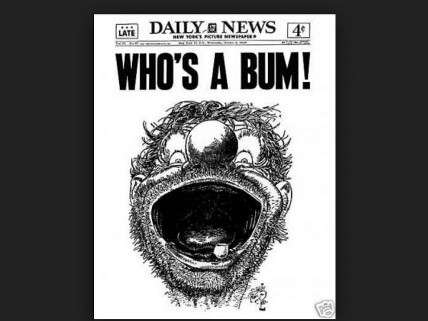Bernie Sanders is a Socialist Because the Dodgers Left Brooklyn
Losing the Dodgers was first "painful lesson about big business," but government contributed to "Dem Bums" move to LA.
According to close friends, the Brooklyn Dodgers' exodus from the gritty streets of

Brooklyn for the sunny skies of Los Angeles at the end of the 1957 season had a "deep impact" on presidential candidate Sen. Bernie Sanders (I-VT) and gave him his first "painful lesson about big business."
In a piece at The Guardian today, several of Sanders' confidants are quoted as saying that the loss of the Dodgers caused the young man to "question who owns what." One of these friends, Huck Gutman, said the Dodgers' exit was akin to "a company that closes a factory, putting people out of jobs, to take advantage of tax breaks offered in elsewhere." He adds:
"We never understood that he who pays the piper plays the tune. It was a lesson that it doesn't matter whether people love (a team) it's all about the money. I don't think there had been those kinds of things. We all know now the sports world is all about making money but this was the first time we saw it. This was uprooting a club that had all these historical links to the community."
The popular conception, both inaccurate and incomplete, is that greedy Dodgers owner Walter O'Malley never tried to stay in Brooklyn and absconded with the team at the first opportune moment he could. The Guardian quotes Sanders saying on a podcast that O'Malley's move was "a brutal act which impacted Brooklyn in a very significant way."
Factually, O'Malley had a plan to stay in Brooklyn and build a larger, more modern stadium to replace decrepit Ebbets Field, where attendance had been dropping for years. But O'Malley's interests ran counter to those of the ultimate urban central planner, the notorious and legendary power broker Robert Moses, who arguably bears at least as much responsibility for the Dodgers move West.
In 2009, Zack O'Malley Greenburg wrote this for Forbes:
For nearly a half-century, Moses was the most powerful person in New York. He masterminded the reshaping of the city and oversaw the construction of almost every major bridge, tunnel and highway, as well as elegant landmarks like the United Nations and Lincoln Center. In the process, he displaced some 500,000 residents, moving most of them into the housing projects that now stand as decaying monuments to his ruthless agenda.
Moses concocted many plans in his day, but building a new ballpark in Brooklyn was not one of them. In fact, Moses had long been eying Flushing Meadows in Queens–the eventual site of Shea Stadium–as a potential site for a grand arena of imperial proportions. So in 1957, when Walter O'Malley and a cadre of New York politicos began to discuss plans for a ballpark at the corner of Flatbush and Atlantic on the sly, Moses was not pleased.
"Robert Moses did not want the city to help O'Malley build the stadium, and his power was so absolute that he could do that," says Robert A. Caro, author of the Pulitzer Prize-winning book The Power Broker, the definitive and devastating biography of Moses. "He'd been wanting to build a park in Flushing Meadows since the 1930s, if not the 1920s. The fact that it wasn't accessible to Brooklyn meant nothing to him."
Had the prevailing narrative been "extraordinarily powerful and unaccountable bureaucrat chased businessman out of town when he insisted on uprooting the Dodgers from Brooklyn and dropping them on a landfill in Queens," would Sanders' politics have evolved as they did?
Yes, actually. They probably would have. But "greedy capitalist breaks hearts and steals Dem Bums from Brooklyn" is certainly an attractive narrative for a budding socialist to hang onto.


Show Comments (169)